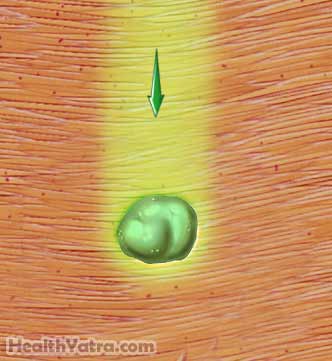تعريف
Radiation therapy is a treatment for cancer and other diseases. It uses high-energy particles to damage the genetic code (DNA) in the cancer cells. This makes the cells unable to grow or divide.
هناك نوعان رئيسيان من radiation therapy:
- External—radiation is delivered by a machine that shoots particles at the cells from outside the body
- Internal—radioactive materials are placed in the body near the cancer cells (also called implant radiation or brachytherapy)
In certain cases, your doctor may recommend a combination of these. Radiation is often used with other types of treatment, such as surgery, chemotherapy, and immunotherapy (stimulates the immune system to fight infection).
This fact sheet will focus on external علاج إشعاعي.
أسباب هذا الإجراء
- Control the growth or spread of cancer
- Attempt to cure cancer
- Reduce pain or other تسببت الأعراض by cancer (This is called palliative radiation.)
Radiation therapy is commonly used to treat:
- Solid tumors such as prostate cancer, سرطان الثدي, and head and neck cancers
- Lymphomas and leukemia
المضاعفات المحتملة
External radiation does not cause your body to become radioactive. It can cause side effects, as the radiation damages your own healthy cells as well as the cancer cells. Common side effects of radiation include, but are not limited to:
- تعب
- Skin changes (redness, irritation)
- Reduced white blood cell count
- تساقط الشعر
- Nausea, vomiting, or diarrhea
- Appetite loss
Discuss the specific side effects that you may have with your doctor.
تشمل العوامل التي قد تزيد من خطر حدوث مضاعفات ما يلي:
- Previous radiation therapy
- A personal history of lupus, scleroderma, or dermatomyositis
A woman who is pregnant or could be pregnant should avoid exposure to radiation. It could harm a developing fetus.
ما يمكن توقعه
قبل الإجراء
You will go through a process called simulation. This takes between 30 minutes and two hours.
- You will lie on an exam table. A radiation therapist uses a CT scan to define the exact place(s) where radiation will be directed. They may mark the exact area on your skin with colored ink. You may also have a small tattoo (or several) placed on your skin. This is as a permanent mark to help aim the radiation beam.
- Depending on the نوع العلاج required, you may also be measured for devices like braces that will help you stay still during treatment.
وصف الإجراء
You will be positioned on the treatment table or chair. The radiation therapist will leave the room and enter a control room. The machine will deliver radiation to certain areas of your body. The most common sources of radiation are x-rays, electron beams, and cobalt-60 gamma rays.
You must be very still during treatment. The therapist can see you on a screen. You can talk with them if you feel uncomfortable or sick.

كم من الوقت سيستغرق ؟
The treatment takes 1-5 minutes. You should allow at least 30 minutes for each session. Most treatments last 2-8 weeks. They are given once a day, five days per week. In some cases, you may be treated twice daily or only three times a week. Treatment schedules will depend on different factors. Talk to your radiation oncologist about the schedule planned for you.
هل سيكون هناك ألم؟
No
متوسط الإقامة في المستشفى
There is no hospital stay. External radiation is typically done at an office visit.
رعاية ما بعد العملية
تأكد من اتباع تعليمات طبيبك.
You will leave and resume your normal activities. You are not radioactive. You are not a threat to anyone else around you, in terms of radiation exposure.
During treatment, your doctor will want to see you at least once a week. You may have routine blood tests to check for the effects of radiation on your blood cells.
After treatment is completed, you will have regular visits to monitor healing and to make sure the treatment affected the disease as planned. Follow-up care will vary for each person. Care may include further testing, medicine, or rehabilitative treatment.
Tell your doctor if you experience side effects. Many side effects can be controlled with medicine or diet. Your doctor may change or delay the course of your treatment if the side effects are too much. Most side effects will gradually go away after treatment.
استدعاء الطبيب
After arriving home, contact your doctor if any of the following occur:
- علامات الإصابة, بما في ذلك حمى وقشعريرة
- Diarrhea or loss of appetite
- غير مفسرة فقدان الوزن
- Frequent urination, particularly if it is associated with pain or burning sensation
- New or unusual swelling or lumps
- Nausea and/or vomiting that you cannot control with the medicines you were given
- Pain that does not go away
- Unusual changes in skin, including bruises, rashes, discharge, or bleeding
- السعال، ضيق التنفس، أو ألم في الصدر
- Any other symptom your nurse or doctor told you to look for
- Any new symptoms
في حالة الطوارئ ، اتصل على المساعدة الطبية على الفور.
